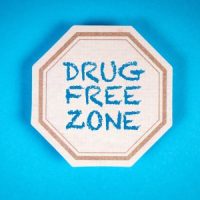What is the Meaning of Drug Free-Zone?

A drug-free zone is a geographic area where additional penalties apply to drug crimes, like possession, distribution, and trafficking. Generally, the drug-free zone enhancement bumps up the penalties one level. For example, possession of a small amount of marijuana is usually a second-degree misdemeanor. Possession of a similar amount of this substance in a drug-free zone is usually a first-degree misdemeanor.
Additionally, trafficking or distributing drugs in a drug-free zone generally includes a mandatory minimum three-year prison sentence. These charges could hold up in court even if no money changes hands. People can distribute drugs for free. The most common example is a person giving leftover pain pills to a coworker. Additionally, prosecutors could bump possession charges to trafficking charges, based on the amount.
Drug-free zone enhancements are very common in dense, urban areas, like St. Petersburg-Tampa. Although the penalties are different, the same basic defenses apply. The Fifth Amendment still restricts police officer interrogations, and the state must still prove every element of the offense beyond any reasonable doubt. As a result, a Tampa drug crime lawyer almost always successfully resolves these charges.
School/Daycare Center
Florida, like many other states, typically applies the 1,000-foot rule to drug-free zones. So, in this example, the drug-free zone begins not at the school or daycare center itself, but at an imaginary line 1,000 feet from the property.
1,000 feet is roughly three football fields. In many communities, pretty much every street corner in town is within that distance of a school or daycare center. The daycare center must usually be a licensed daycare center. Licensed home facilities count, but homes with babysitters or au pairs don’t count.
Hourly restrictions apply to these drug-free zones. Usually, school zones are only considered drug-free zones between the hours of 6 a.m. and 12 a.m. Furthermore, the school/daycare center drug-free zone usually extends to school bus stops, school athletic facilities, and children on field trips.
Park/Community Center
The 1,000-foot rule, and the concerns associated with this rule, also applies to parks and community centers. Many pundits argue that this rule is excessively unfair and also disproportionately affects nonwhite people.
Only public parks, community centers, and other such facilities are drug-free zones in Florida. Many parks and other such areas are publicly accessible, but not publicly owned and operated, or at least not wholly publicly owned and operated. A Tampa criminal defense lawyer could argue that the drug-free zone prohibition doesn’t apply to church parks, homeowners association parks, and other such areas.
Place of Worship
However, if a church or religious institution owned the park, a different drug-free zone prohibition may apply.
Many churches are in gray areas. For example, many churches host community functions. If that’s the case, the church is arguably not a church, at least at that particular time. Furthermore, many churches meet in hotel event rooms and other non-traditional places. It’s not clear if this arrangement transforms the hotel or other place into a drug-free zone.
Count on a Diligent Hillsborough County Attorney
A criminal charge is not the same thing as a criminal conviction. For a confidential consultation with an experienced criminal defense lawyer in Tampa, contact the OA Law Firm. Virtual, home, and jail visits are available.
Source;
oppaga.fl.gov/Documents/Presentations/P18-03.PDF




